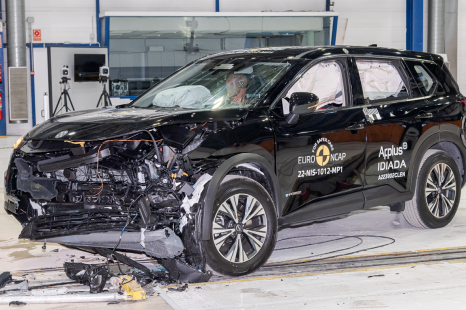

William Stopford
2 Years Ago
Landing more than two years after it was revealed globally in US-market form, the new X-Trail promises to be a huge improvement on its long-serving predecessor model that remains one of Australia’s most popular SUVs.
Prices are up, but so too are the levels of technology, and the design is notably more contemporary. Indeed, Nissan refers to the new X-Trail as its “most advanced SUV to date”.
| Configuration | Price From* |
|---|---|
| 2.5L, Automatic, 5-door SUV, Petrol, 4x4 | $46,115 |
| Configuration | Price From* |
|---|---|
| 2.0L, 6-speed manual, 5-door SUV, Petrol, FWD | $30,665 |
| 2.5L, Automatic, 5-door SUV, Petrol, FWD | $32,665 |
| 2.5L, Automatic, 5-door SUV, Petrol, 4x4 | $34,665 |
| Configuration | Price From* |
|---|---|
| 2.5L, Automatic, 5-door SUV, Petrol, FWD | $40,125 |
| 2.5L, Automatic, 5-door SUV, Petrol, 4x4 | $40,675 |
| Configuration | Price From* |
|---|---|
| 2.5L, Automatic, 5-door SUV, Petrol, FWD | $34,140 |
| 2.5L, Automatic, 5-door SUV, Petrol, 4x4 | $36,140 |
See our comprehensive details for the Nissan X-Trail
The dimensions shown above are for the base model.
See all 2022 Nissan X-Trail DimensionsBoot space in the regular X-Trail range is 585 litres up to the cargo blind, although e-Power versions have a 10L smaller space to play with.
CarExpert High Resolution Photos of the Nissan X-Trail
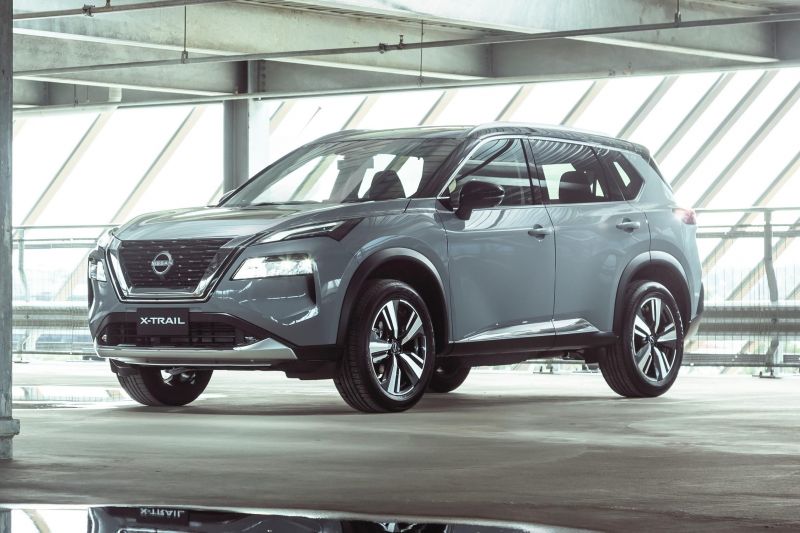
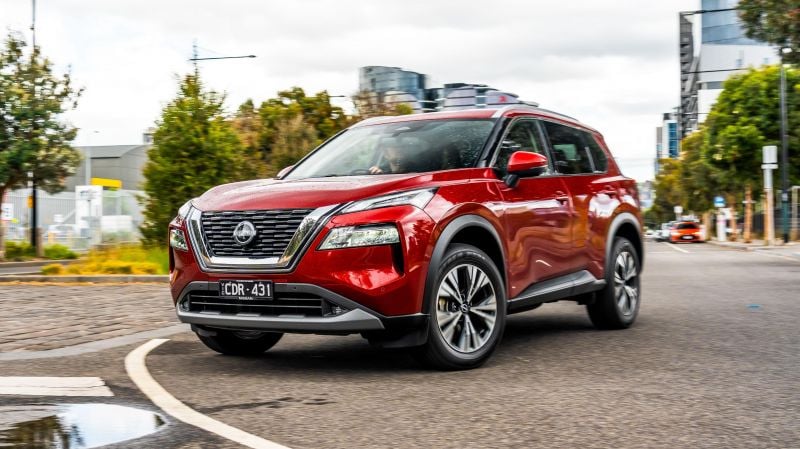
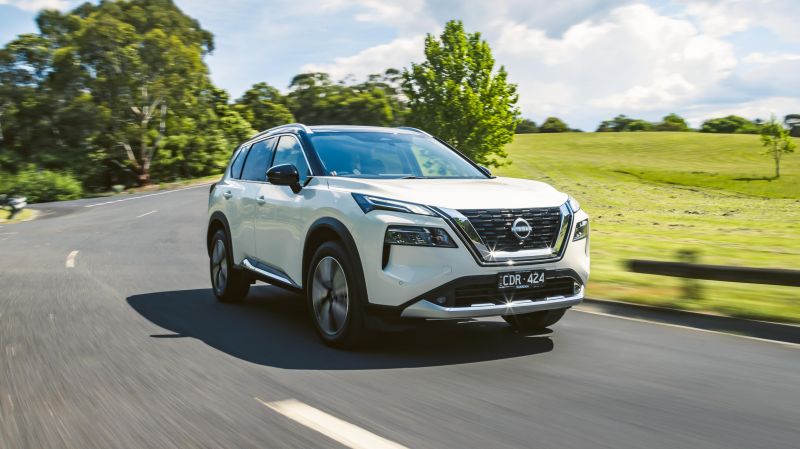
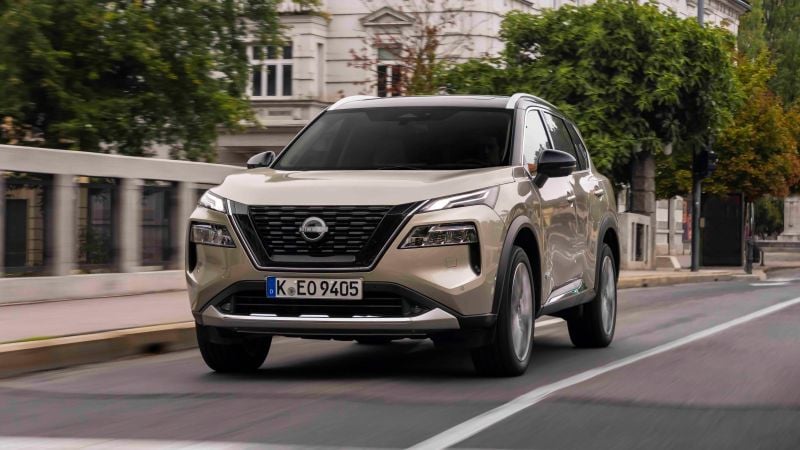
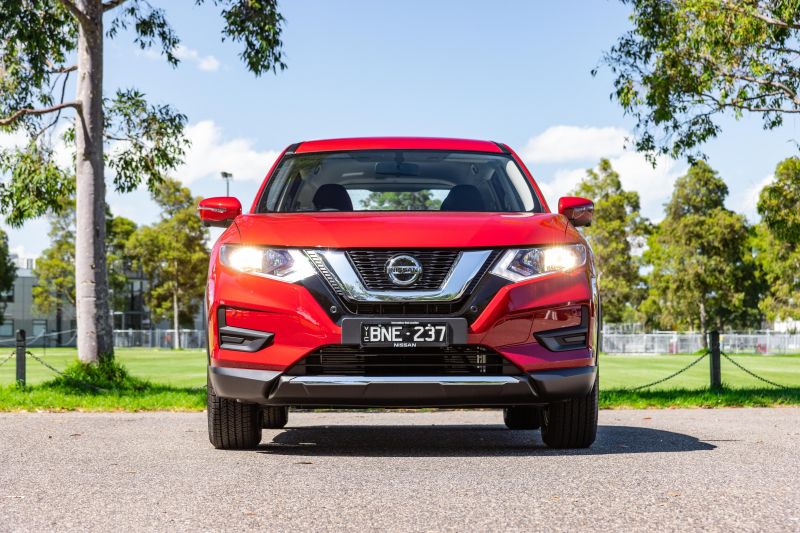
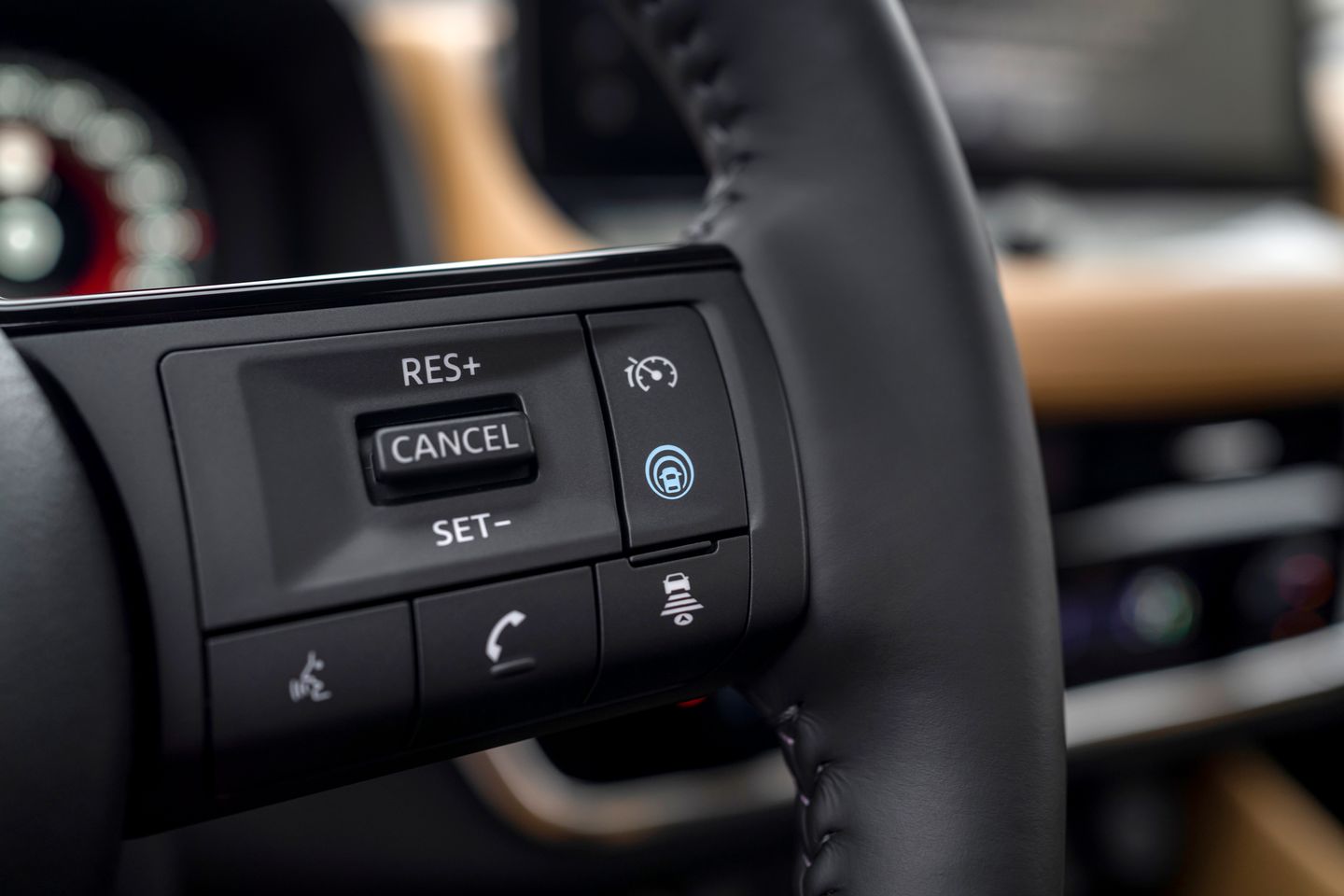
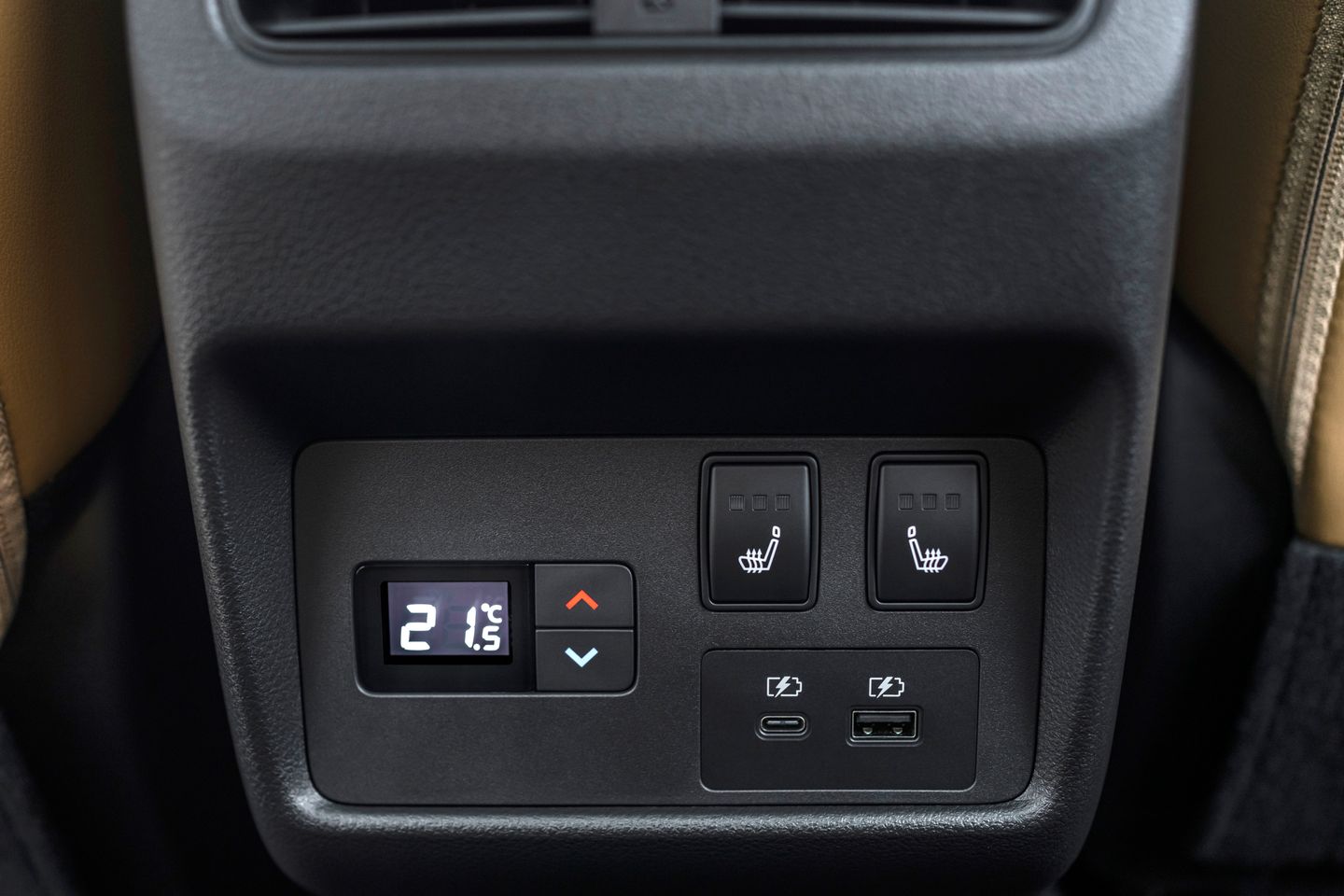
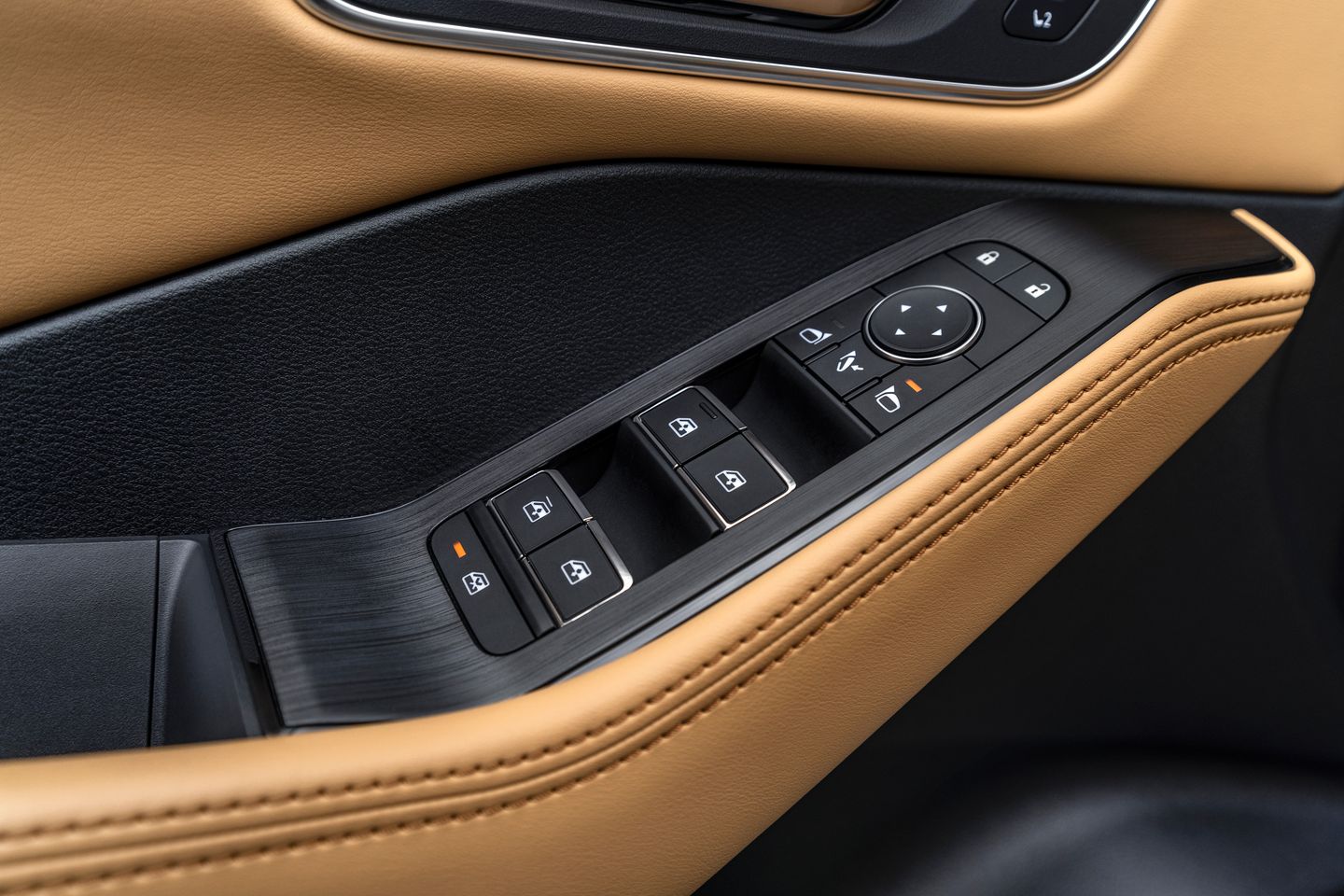
View 50 images
Despite the Nissan X-Trail and Mitsubishi Outlander sharing the same platform, it’s hard to spot the similarities inside the cabin. Each has their own unique features and it feels like Nissan has gone with a more premium approach.
The X-Trail e-Power will come standard in Australia with a big 12.3-inch colour touchscreen display, in addition to a 12.3-inch display ahead of the driver. The head-up display is also big, measuring in at a little more than 10 inches in size, meaning it can offer a huge amount of addressable information.
Along the dashboard, doors and centre trims you’ll find soft-touch leather-esque materials, while a dual-tiered centre console and big centre console bin offer a surprising amount of storage.
The infotainment system features wireless Apple CarPlay and wired Android Auto, while audio comes in the form of AM/FM and DAB+ digital radio, all sent through a 10-speaker Bose-branded premium sound system.
The glass roof runs all the way to the second row with the front half capable of being opened, while an electric blind offers full closure. Second-row seats also get manually-retractable window shades.
Both front seats offer 10-way power adjustment with memory, in addition to seat heating and steering wheel heating.
There’s a stack of connectivity throughout the car with wireless phone charging, USB-C and USB-A connectivity in the first and second rows.
The second row is pretty spacious with ample leg and headroom for adults. While we won’t be getting the seven-seat version in Australia, the second row can slide by up to 200mm and recline to offer more boot space.
Speaking of which, cargo space isn’t greatly compromised due to the hybrid system. Cargo capacity comes in at 575 litres to the cargo blind, which is 10 litres down on the non-hybrid X-Trail.
The 1.8kWh battery is located beneath the passenger seat and Nissan has employed a clever system of cooling for the battery. It’s an air-cooled battery that draws air in from the cabin beneath the passenger seat – it then passes over the cells and exits behind the C-pillar.
Nissan’s testing of battery thermal management included a number of high speed charge and discharge cycles, but the one we found most interesting was loading the car up to payload capacity with a full roof load.
The engineering team then drove the car at maximum speed on the Autobahn on the highest continuous grade of derestricted road.
This 4.0 per cent grade lasted for 13km at maximum speed and didn’t see the battery discharge or overheat beyond the design parameters. Given this is the worst case scenario for a customer, it’s likely to pass the test regardless of what you’re doing with the car.
Nissan also helped reduce the weight of the vehicle by using a plastic-formed tailgate, along with aluminium doors and hood.
An ANCAP crash rating is still to come.
Standard features in all grades
Standard on ST-L and above
| Nissan X-Trail | Fuel Type | Combined |
|---|---|---|
| 2.5L, Automatic, 5-door SUV, Petrol, 4x4 | Unleaded | 8.3 L/100km |
What are the running and servicing costs of a Nissan X-Trail?
Nissan hasn't yet confirmed service pricing for the 2023 Nissan X-Trail.
Our expert take on Nissan X-Trail drivability.
Impressions are of the e-Power
Having driven a number of hybrid vehicles previously, they all kind of feel and sound the same way. They’re quiet until you need to step on the throttle and then there is a symphony of noise inside the cabin as a CVT flares up to supplement the hybrid system’s torque.
The system within the X-Trail feels more like an EV in its operation. Torque delivery is smooth and progressive and the only time you really notice the internal combustion engine is when the battery is depleted and you get on the throttle.
Outside of that it remains fairly quiet inside the cabin. You can also operate the X-Trail e-Power in EV mode up to 90km/h or until heavier throttle applications occur.
To the average person driving the X-Trail, it feels fairly normal and doesn’t feel out of the ordinary.
There are inconsistencies between applying the throttle and hearing the petrol engine – as sometimes the vehicle will take energy from the battery instead of firing up the petrol engine initially. It takes a bit of getting used to, but outside of that it’s pretty straightforward.
The Ti-L will come standard with 20-inch alloy wheels, and we were pretty surprised with how good the ride was. It’s worth keeping in mind the roads we drove on in Slovenia were well maintained and not really representative of what we have in Australia.
Likewise road and wind noise – even at 130km/h highway speeds – was subdued and incredibly quiet for a vehicle this size, to the point where it feels more refined than the Mitsubishi Outlanderthe X-Trail shares a platform with.
There was a good link between regeneration and the mechanical brakes with two additional regen modes the driver is able to choose from.
Switching the gear shifter to B mode allows up to .15g of regenerative deceleration when the throttle is released, while hitting the e-Pedal button allows up to .2g of regenerative deceleration along with the further application of mechanical brakes to bring the car to around 10-20km/h before deceleration stops.
It’s a little disappointing the e-Pedal didn’t bring the car to a full stop without the driver needing to intervene. According to Nissan, customer feedback suggested it was too difficult to use (like in the Leaf where it comes to a full stop) and as a result they preferred to just use the brakes at lower speeds.
Another clever feature Nissan integrated into the X-Trail e-Power was technology that routed regen through the generator and internal combustion engine when the battery is full.
Typically a hybrid will stop the deceleration that occurs thanks to regeneration when the battery system is full. This typically occurs on a long downhill stretch. When this point is reached often a hybrid won’t slow down at all like it would when the battery had less charge.
Here in the X-Trail e-Power, it turns to the internal combustion engine for relief in these situations. The inverters and generator via the electric motors run the generator and petrol engine to further slow the vehicle when no more energy can be captured.
It’s not actually using any fuel when it does this, but it creates an outlet to send the energy the car would otherwise lose as heat in the mechanical brakes. It also allows regen to occur through both motors instead of just the one, which provides a more progressive slow down with less pitch.
In terms of dynamics, Nissan has dialled in a reasonable amount of steering feel, and when you switch from the regular driving mode to Sport it offers sharper throttle response and an engaging drive by virtue of instant torque availability on both axles.
The body sits nice and flat through corners and despite its weight – just over 1900kg – and it actually feels fun to drive if you find a nice mountain pass like we did. Torque vectoring is initiated using the brakes and it allows the car to tuck in through corners when the throttle is applied and more traction is needed on either side of the axle.
Here in the X-Trail e-Power, it turns to the internal combustion engine for relief in these situations. The inverters and generator via the electric motors run the generator and petrol engine to further slow the vehicle when no more energy can be captured.
It’s not actually using any fuel when it does this, but it creates an outlet to send the energy the car would otherwise lose as heat in the mechanical brakes. It also allows regen to occur through both motors instead of just the one, which provides a more progressive slow down with less pitch.
In terms of dynamics, Nissan has dialled in a reasonable amount of steering feel, and when you switch from the regular driving mode to Sport it offers sharper throttle response and an engaging drive by virtue of instant torque availability on both axles.
The body sits nice and flat through corners and despite its weight – just over 1900kg – and it actually feels fun to drive if you find a nice mountain pass like we did. Torque vectoring is initiated using the brakes and it allows the car to tuck in through corners when the throttle is applied and more traction is needed on either side of the axle.
What colours are available for the Nissan X-Trail
Nissan Australia provides a five-year unlimited warranty.
Capped-price servicing details haven't yet been provided.
The new Nissan X-Trail shares its underpinnings with the Mitsubishi Outlander, and is therefore a close rival for it.
It also takes on the Toyota RAV4, Mazda CX-5, Honda CR-V, and Volkswagen Tiguan in the hotly-contested mid-sized SUV class.
Is this the right car for you? Out experts buy or not guide.
The cheapest Nissan X-Trail is the ST that starts from $30,665.
The most expensive Nissan X-Trail is the Ti that starts from $46,115.
The best towing capacity of a Nissan X-Trail is 1500 kg offered by the following variants: ST, ST+, ST-L and Ti.
The largest Nissan X-Trail is the ST which measures 1820mm wide, 4690mm in length and sits 1740mm tall.
The most powerful Nissan X-Trail is the ST which has 126kW of power from its 2.5L MULTI-POINT INJECTION engine.
The Nissan X-Trail is built in Japan and shipped to Australia.
The heaviest Nissan X-Trail is the ST which weighs 0 kg (kerb weight).
The Nissan X-Trail uses unleaded.